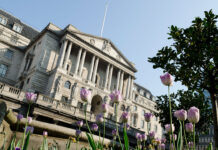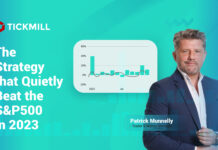The Consumer Price Index (CPI) rose to 9% in April compared to 7% in March, according to figures reported by the Office of National Statistics (ONS) today.
The rise represents the highest 12-month growth since records began in 1997, and is also the highest rate on record for the constructed historical series, which kicked off in 1989.
The ONS commented that the last time inflation hit its current high was 40 years ago in 1982, with projections in the range of 6.5% in December to almost 11% in January.
Meanwhile, the CPI including owner occupiers’ housing costs (CPIH) gained by 7.8% year-on-year, marking an increase from 6.2% in March, the highest rate since records began in 2006.
The increase of 1.6% also marked the largest annual rate growth in the National Statistics series, along with the constructed series, which began in 1989.
CPIH rose approximately 2.1% in April 2022 on a monthly basis, against an uptick of 0.7% in April the last year.
Pain at the Pumps
The surge in inflation was attributed to housing and household services, which represented 2.7% of the annual rise, with the bulk of the rise due to climbing electricity, gas, fuel and other housing costs, while transport accounted for 1.4% of the growth.
The ONS confirmed the largest upward contributors to the CPIH increase were related to housing and household services at 1.2%, with restaurants and hotels contributing 0.1% and recreation and culture accounted for a 0.1% rise.
The most significant downward contribution was reportedly due to clothing and footwear, which contributed 0.09% to the figures.
“The surge in energy prices is draining us dry, after gas prices almost doubled in a year. In April, the huge hike in the energy price cap pushed inflation to a 40-year high of 9%,” said Hargreaves Lansdown senior personal finance analyst Sarah Coles.
“Unfortunately, this doesn’t come as a massive surprise to anyone. After-all we have been living through this horrible period, so we know all-too well how expensive life is getting.”
The energy price cap rose 54% in April, sending household energy budgets skyrocketing with an additional £700 per year in energy costs.
The war in Ukraine sent the cost of gas up by almost 100% year-on-year, and petrol surged to 161.8p per litre compared to 125.5p month-on-month, setting the price of filling a 55-litre car at £19.97 higher than in April 2021.
Analysts revealed that 40% of people had cut back on non-essential car travel to save on fuel costs.
The energy price cap is scheduled for a further rise between 30% to 50% in October this year, which is set to pile even more pain onto struggling consumers.
“What makes things even worse, is that we know that this is just the first blow, and we’re set for a follow-up in October that could send us reeling,” said Coles.
“Energy price hikes would be bad enough on their own, but we’re also having to deal with record fuel costs, eye-watering rises in supermarket prices and the soaring cost of home repairs and improvements.”
Food Prices
The cost of living is also starting to strain household food budgets, with a reported 41% of consumer making the concerning decision to purchase less from grocery stores, demonstrating that the crushing rate of inflation has already gone far beyond impacting frivolous purchases such as high-end fashion and specialty goods.
The price of food and non-alcohol drink rose 6.7% since last year, with pasta increasing 10.4%, milk rising 16.1% and margarine spiking 22.7% across supermarket offerings.
“Unfortunately, these price rises aren’t over yet. The conflict in Ukraine has pushed up the price of food globally, but it has also accelerated the rising cost of animal feed and fertiliser, which are feeding through into farm costs,” said Coles.
“When you add in the cost of fuel for manufacturing and distribution, it will keep pushing prices up at the supermarket in the coming months.”
Interest Rates to Rise
The Bank of England have been urged by the government and by consumers to tackle the issue of surging inflation, which has run far beyond its target rate of 2%. However, Bank governor Andrew Bailey told cabinet ministers this week that he was powerless to stop the crushing tide of inflation, despite the institution’s efforts to stamp out spiking costs by hiking interest rates 0.25% to 1% earlier this month.
The Bank is set to raise interest rates to 1.25% in its next meeting in June, however experts have warned that this will not stop inflation in its tracks, and it will add a fresh burden to households already struggling to cut down on the essentials to survive.
The UK economy has been through an awful month of inflation; unfortunately, with inflation set to hit 10% in October, the worst is yet to come on the horizon.





